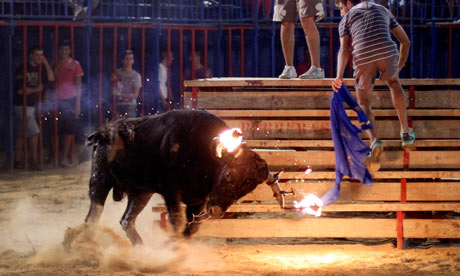The title of "The Way" refers to the Camino de Santiago de Campostela, the 1,000-year old route from France to northern Spain that thousands of peregrinos, or pilgrims, walk each year, ending at the site where the remains of Saint James are reportedly buried. But if you think watching "The Way" will be akin to eating your theological spinach - Sunday School on the silver screen - think again. Writer-director Emilio Estevez instead treats viewers to a sensuous, expansive hymn to travel and transformation in a movie that honors earthly pleasures as readily as it contemplates higher things. Anchored by a career-redefining performance by Estevez's father, Martin Sheen, "The Way" behaves much like the many hostels and tiny inns that give Camino travelers food and shelter on the road toward Spain: It's modest, warm and welcoming, never insisting on a particular pace or philosophical bent, but always staying open. Sheen plays Tom Avery, a California ophthalmologist whose son Daniel (Estevez) is killed in a freak storm just as he is beginning the Camino. Traveling to France to gather Daniel's remains, Tom makes the impulsive decision to finish the pilgrimage on his son's behalf, putting on the younger man's backpack and setting off for Basque country. The scene when Tom embarks on the route is just the first of many sight gags that punctuate "The Way," letting viewers know that they're not in for any maudlin grieving-father melodrama or tight-lipped tutorial. When Tom - played with flawless deadpan misanthropy by the ageless Sheen - makes three unlikely friends along the road, the jokes and banter continue apace, with a portly, pot-smoking Dutchman named Joost (Yorick van Wageningen) providing most of the laughs. Joost, it turns out, is walking the Camino not for religious reasons but to lose weight for his brother's wedding; Sarah (Deborah Kara Unger), an icy blonde from Canada who speaks in tough, film noir cadences, has vowed to quit smoking when she reaches the Cathedral of St. James. Jack (James Nesbitt), whom the three meet late in their journey, is a would-be author suffering from writer's block. As a stand-in for Jack Hitt, whose book "Off the Road: A Modern-Day Walk Down the Pilgrim's Route in Spain" inspired "The Way," Jack occasionally comes off like the Chief Explainer, providing paragraphs of exposition on the Camino's origins and its allegorical potential (the road, he giddily tells his fellow travelers, is a veritable "metaphor bonanza"). But if Jack's soliloquies feel a tad tacked-on at times, the rest of "The Way" unfolds with relaxed, unforced ease, including Tom's occasional glimpses of his late son accompanying him like a benevolent angel. Estevez seamlessly knits those magical sequences in with the otherwise rigorously realist aesthetic of "The Way," which was filmed on the Camino and features real-life peregrinos as background players. With such a strong grounding in setting and spirit, "The Way" ends up being one of those movies that works not just as a story but as a vivid, immersive experience, bringing viewers into the Camino's most legendary refugios (the innkeeper named Ramon is based on a real-life man), as well as the route's most breathtaking vistas. Funny, moving, hip and transcendent all at the same time, "The Way" is both deeply thoughtful and enormous fun to watch. Its rewards are as rich for the secular as for the more spiritually inclined. Whether you come to play or pray, Estevez has made a movie of beauty, humor and disarmingly humble devotion.













 Spain has been named among the top five destinations that people would consider moving to if they were going to leave the UK, new research has found. A survey conducted by Post Office International Payments revealed that the European nation, which was the fourth most popular location named in the poll, was a possible choice for ten per cent of those questioned. The firm also pointed out that it was the highest-placed nation where English is not the first language. One of the top reasons given for buying a property in Spain or elsewhere in the world is the chance to have a better quality of life, while other reasons to move included warmer weather, discovering a new culture and the adventure of emigrating. Mortgage provider Conti published figures earlier this month showing that it has received seven per cent more enquiries about relocating to Spain so far in 2011 than last year. Overall, the country accounts for 31 per cent of all queries handled by the organisation, with only France garnering more interest.
Spain has been named among the top five destinations that people would consider moving to if they were going to leave the UK, new research has found. A survey conducted by Post Office International Payments revealed that the European nation, which was the fourth most popular location named in the poll, was a possible choice for ten per cent of those questioned. The firm also pointed out that it was the highest-placed nation where English is not the first language. One of the top reasons given for buying a property in Spain or elsewhere in the world is the chance to have a better quality of life, while other reasons to move included warmer weather, discovering a new culture and the adventure of emigrating. Mortgage provider Conti published figures earlier this month showing that it has received seven per cent more enquiries about relocating to Spain so far in 2011 than last year. Overall, the country accounts for 31 per cent of all queries handled by the organisation, with only France garnering more interest.
 When Spanish bullfighter Serafin Marin plunges his sword into the back of a bull's neck in Barcelona on Sunday, he will be marking the end of an era. The bull will not only be the last of six killed in the bullfight, but the last-ever to be killed in Barcelona's Monumental bullring, which is nearly a century old. The closure of the Monumental - in keeping with a bullfighting ban in the north-eastern region of Catalonia - reflects the decline of bullfighting in Spain, though fans of the country's 'national fiesta' vow to fight on. 'We have lost a battle, but not the war,' Marin told the daily El Mundo. But animal rights campaigner Aida Gascon said, 'Now that we have achieved (the end of bullfights) in Catalonia, we shall try to finish with them in the rest of Spain.' Catalonia, a wealthy region of 7.5 million people, has spearheaded the campaign against bullfights, or 'corridas,' in a country where animal rights activism is on the rise. The Catalan capital of Barcelona declared itself an 'anti-bullfight' city in 2004. Dozens of other municipalities followed suit, and finally in July 2010 the regional parliament outlawed bullfights from January 1, 2012. The Canary Islands had already done so in 1991, as part of a more general animal protection law, but that decision had gone largely unnoticed. The Catalan opposition to bullfights is explained not only by animal rights activism, but also by Catalan nationalism, many of whose representatives see 'corridas' as an expression of Spanishness. The region with separatist currents 'wants to eliminate everything that represents Spain,' Marin said. Bullfighting remains an important industry in Spain with an annual turnover of more than 2.5 billion euros (3.5 billion dollars), contributing to 0.25 per cent of gross domestic product. It provides direct employment to 200,000 people, including bullfighters, or 'toreros,' bull breeders, managers and others. Yet gradually the spectacle that once inspired artists and writers such as Pablo Picasso and Ernest Hemingway is losing its appeal. Only 37 per cent of Spaniards are interested in bullfights, while 60 per cent dislike them, according to a 2010 poll. 'Corridas' are least popular among young people. Animal rights campaigners see the event, in which darts are stuck into the back of the animal's neck before the 'torero' kills it with his sword, as torture. Some observers attribute the decline also to other causes, ranging from Spain's economic crisis to an alleged deterioration of the race of the Iberian 'brave bull.' Not only are bulls' horns 'shaved' to make them less dangerous, but they are also losing their fighting spirit, some bullfighting commentators complain. Another important reason for the decline of 'corridas' is their image as an old-fashioned form of entertainment. 'Young people do not choose an anachronistic spectacle,' anti-bullfight campaigner Helena Escoda said. Even Catalonia, however, has not outlawed other bull spectacles, such as bull runs. Some Spanish regions have come out in defence of the 'corrida,' describing it as a part of their cultural heritage. Prime Minister Jose Luis Rodriguez Zapatero's government placed bullfights under the responsibility of the Culture Ministry, instead of the Interior Ministry. The opposition conservative People's Party, which is expected to win the November 20 parliamentary elections, has taken legal action against the Catalan bullfighting ban at the Constitutional Court. Catalan bullfighting enthusiasts have also collected 300,000 signatures in defence of the fiesta. Yet it is far from certain that such initiatives will stop what many see as an inevitable social development. Catalan bullfighters, in the meantime, are planning to face the bull elsewhere in Spain or in the south of France.
When Spanish bullfighter Serafin Marin plunges his sword into the back of a bull's neck in Barcelona on Sunday, he will be marking the end of an era. The bull will not only be the last of six killed in the bullfight, but the last-ever to be killed in Barcelona's Monumental bullring, which is nearly a century old. The closure of the Monumental - in keeping with a bullfighting ban in the north-eastern region of Catalonia - reflects the decline of bullfighting in Spain, though fans of the country's 'national fiesta' vow to fight on. 'We have lost a battle, but not the war,' Marin told the daily El Mundo. But animal rights campaigner Aida Gascon said, 'Now that we have achieved (the end of bullfights) in Catalonia, we shall try to finish with them in the rest of Spain.' Catalonia, a wealthy region of 7.5 million people, has spearheaded the campaign against bullfights, or 'corridas,' in a country where animal rights activism is on the rise. The Catalan capital of Barcelona declared itself an 'anti-bullfight' city in 2004. Dozens of other municipalities followed suit, and finally in July 2010 the regional parliament outlawed bullfights from January 1, 2012. The Canary Islands had already done so in 1991, as part of a more general animal protection law, but that decision had gone largely unnoticed. The Catalan opposition to bullfights is explained not only by animal rights activism, but also by Catalan nationalism, many of whose representatives see 'corridas' as an expression of Spanishness. The region with separatist currents 'wants to eliminate everything that represents Spain,' Marin said. Bullfighting remains an important industry in Spain with an annual turnover of more than 2.5 billion euros (3.5 billion dollars), contributing to 0.25 per cent of gross domestic product. It provides direct employment to 200,000 people, including bullfighters, or 'toreros,' bull breeders, managers and others. Yet gradually the spectacle that once inspired artists and writers such as Pablo Picasso and Ernest Hemingway is losing its appeal. Only 37 per cent of Spaniards are interested in bullfights, while 60 per cent dislike them, according to a 2010 poll. 'Corridas' are least popular among young people. Animal rights campaigners see the event, in which darts are stuck into the back of the animal's neck before the 'torero' kills it with his sword, as torture. Some observers attribute the decline also to other causes, ranging from Spain's economic crisis to an alleged deterioration of the race of the Iberian 'brave bull.' Not only are bulls' horns 'shaved' to make them less dangerous, but they are also losing their fighting spirit, some bullfighting commentators complain. Another important reason for the decline of 'corridas' is their image as an old-fashioned form of entertainment. 'Young people do not choose an anachronistic spectacle,' anti-bullfight campaigner Helena Escoda said. Even Catalonia, however, has not outlawed other bull spectacles, such as bull runs. Some Spanish regions have come out in defence of the 'corrida,' describing it as a part of their cultural heritage. Prime Minister Jose Luis Rodriguez Zapatero's government placed bullfights under the responsibility of the Culture Ministry, instead of the Interior Ministry. The opposition conservative People's Party, which is expected to win the November 20 parliamentary elections, has taken legal action against the Catalan bullfighting ban at the Constitutional Court. Catalan bullfighting enthusiasts have also collected 300,000 signatures in defence of the fiesta. Yet it is far from certain that such initiatives will stop what many see as an inevitable social development. Catalan bullfighters, in the meantime, are planning to face the bull elsewhere in Spain or in the south of France.
 U.S. deep-sea explorers must turn over to the Spanish government 17 tons of silver coins and other treasure recovered from a sunken Spanish galleon in 2007, a federal appeals court ruled Wednesday. But Tampa, Fla.-based Odyssey Marine Exploration has vowed to continue the protracted legal battle over the cache, which could be worth as much as $500 million. In a statement Wednesday, the company said it would take the next step in the appeals process, requesting a hearing before all the judges of the 11th Circuit Circuit Court of Appeals. That came after a three-judge panel of the 11th Circuit had issued its ruling in a case that could case spill over to treasure hunts for years to come. "We are certainly disappointed by the 11th Circuit's ruling," said Melinda MacConnel, Odyssey's vice president and general counsel. "We believe the U.S. Constitution and all other applicable laws give jurisdiction to the U.S. courts to determine the rights of Odyssey, Spain and all other claimants in this case." Attorneys for Odyssey asked the three-judge panel to overturn a lower court ruling and uphold the "finders keepers" rule that would give the treasure hunters the rights to coins, copper ingots, gold cufflinks and other artifacts salvaged in April 2007 from the galleon found off the coast of Portugal. Spain's lawyers countered that U.S. courts are obligated by international treaty and maritime law to uphold Spain's claim to the haul. The ship, called the Nuestra Senora de las Mercedes, was sunk by British warships in the Atlantic in 1804 while sailing back from South America with more than 200 people on board. Odyssey created an international splash in May 2007 when it announced that it had recovered more than 500,000 silver coins and other artifacts from the wreck and flew the treasure back to Tampa. Spain went to the U.S. District Court in Tampa, where the company is based, claiming ownership. Odyssey disputed the Spanish government's ownership of the valuable cargo. James Goold, a Washington attorney who represented the Spanish government in court, called the appeals court decision "a complete and much-deserved victory." "The court recognized that stripping the sunken Spanish ship of coins to sell to collectors is no more appropriate than to do that to the USS Arizona in Pearl Harbor," Goold said. "We are pleased and gratified that the court recognized U.S. obligations under international law, just as Spain respects the sanctity of sunken U.S. Navy ships." A federal judge sided with Spain in the first round of the tug-of-war in June 2009, accepting the Spanish government's argument that it never surrendered ownership of the ship and its contents. Attorneys argued the case before the 11th Circuit panel in May. Odyssey had argued that the wreck was never positively identified as the Nuestra Senora de las Mercedes. And if it was that vessel, then the ship was on a commercial trade trip — not a sovereign mission — at the time it sank, meaning Spain would have no firm claim to the booty. International treaties generally hold that warships sunk in battle are protected from treasure seekers.
U.S. deep-sea explorers must turn over to the Spanish government 17 tons of silver coins and other treasure recovered from a sunken Spanish galleon in 2007, a federal appeals court ruled Wednesday. But Tampa, Fla.-based Odyssey Marine Exploration has vowed to continue the protracted legal battle over the cache, which could be worth as much as $500 million. In a statement Wednesday, the company said it would take the next step in the appeals process, requesting a hearing before all the judges of the 11th Circuit Circuit Court of Appeals. That came after a three-judge panel of the 11th Circuit had issued its ruling in a case that could case spill over to treasure hunts for years to come. "We are certainly disappointed by the 11th Circuit's ruling," said Melinda MacConnel, Odyssey's vice president and general counsel. "We believe the U.S. Constitution and all other applicable laws give jurisdiction to the U.S. courts to determine the rights of Odyssey, Spain and all other claimants in this case." Attorneys for Odyssey asked the three-judge panel to overturn a lower court ruling and uphold the "finders keepers" rule that would give the treasure hunters the rights to coins, copper ingots, gold cufflinks and other artifacts salvaged in April 2007 from the galleon found off the coast of Portugal. Spain's lawyers countered that U.S. courts are obligated by international treaty and maritime law to uphold Spain's claim to the haul. The ship, called the Nuestra Senora de las Mercedes, was sunk by British warships in the Atlantic in 1804 while sailing back from South America with more than 200 people on board. Odyssey created an international splash in May 2007 when it announced that it had recovered more than 500,000 silver coins and other artifacts from the wreck and flew the treasure back to Tampa. Spain went to the U.S. District Court in Tampa, where the company is based, claiming ownership. Odyssey disputed the Spanish government's ownership of the valuable cargo. James Goold, a Washington attorney who represented the Spanish government in court, called the appeals court decision "a complete and much-deserved victory." "The court recognized that stripping the sunken Spanish ship of coins to sell to collectors is no more appropriate than to do that to the USS Arizona in Pearl Harbor," Goold said. "We are pleased and gratified that the court recognized U.S. obligations under international law, just as Spain respects the sanctity of sunken U.S. Navy ships." A federal judge sided with Spain in the first round of the tug-of-war in June 2009, accepting the Spanish government's argument that it never surrendered ownership of the ship and its contents. Attorneys argued the case before the 11th Circuit panel in May. Odyssey had argued that the wreck was never positively identified as the Nuestra Senora de las Mercedes. And if it was that vessel, then the ship was on a commercial trade trip — not a sovereign mission — at the time it sank, meaning Spain would have no firm claim to the booty. International treaties generally hold that warships sunk in battle are protected from treasure seekers.







